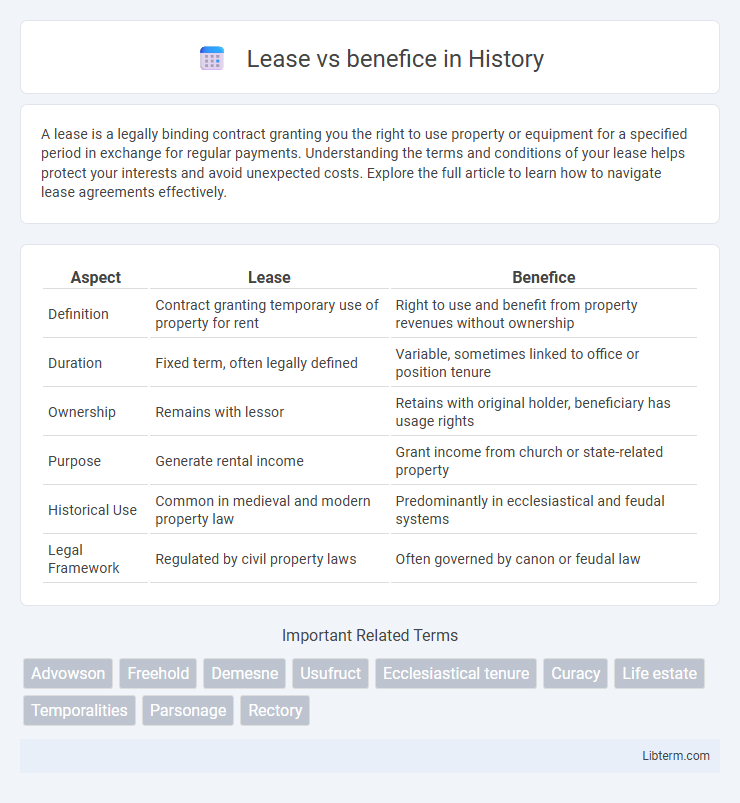A lease is a legally binding contract granting you the right to use property or equipment for a specified period in exchange for regular payments. Understanding the terms and conditions of your lease helps protect your interests and avoid unexpected costs. Explore the full article to learn how to navigate lease agreements effectively.
Table of Comparison
| Aspect | Lease | Benefice |
|---|---|---|
| Definition | Contract granting temporary use of property for rent | Right to use and benefit from property revenues without ownership |
| Duration | Fixed term, often legally defined | Variable, sometimes linked to office or position tenure |
| Ownership | Remains with lessor | Retains with original holder, beneficiary has usage rights |
| Purpose | Generate rental income | Grant income from church or state-related property |
| Historical Use | Common in medieval and modern property law | Predominantly in ecclesiastical and feudal systems |
| Legal Framework | Regulated by civil property laws | Often governed by canon or feudal law |
Introduction to Lease and Benefice
A lease is a contractual agreement where the lessor grants the lessee the right to use an asset, typically real estate, for a specified period in exchange for rent. Benefice, in legal and property contexts, refers to a right to enjoy the profits or benefits arising from an estate or property without owning it outright. Understanding the distinction involves recognizing that a lease transfers temporary possession and use, while a benefice conveys enduring rights to income or benefits derived from the asset.
Historical Background of Lease and Benefice
Leases originated in medieval Europe as legal arrangements enabling tenants to use land or property in exchange for rent, fostering economic stability and agricultural productivity. Benefices emerged in the same period within the ecclesiastical domain, granting church officials revenues from land or property in return for spiritual duties or services. Understanding the historical distinction reveals how leases emphasized secular property rights, while benefices linked land tenure to religious responsibilities and social hierarchy.
Definitions: What is a Lease?
A lease is a legally binding contract in which a property owner grants a tenant the right to use and occupy the property for a specified period in exchange for rent payments. It outlines terms such as duration, rent amount, maintenance responsibilities, and conditions for renewal or termination. Leases provide tenants with possession rights but do not transfer ownership of the property.
Definitions: What is a Benefice?
A benefice is a grant or endowment made to a cleric that provides a fixed income or property for the discharge of religious duties, often linked to a specific ecclesiastical office or parish. Unlike a lease, which is a contractual agreement for the temporary use of property in exchange for rent, a benefice is tied to spiritual responsibilities and typically remains in effect as long as the holder performs these duties. The legal framework governing benefices often involves canon law, distinguishing it from secular lease agreements.
Legal Differences Between Lease and Benefice
A lease grants a tenant contractual rights to use and occupy property for a specified term, typically involving rent payment, whereas a benefice confers a legal right to usufruct or income from ecclesiastical property without transferring possession. Lease agreements are governed by civil or property law, emphasizing temporary possession and obligations between private parties, while benefices are rooted in canon law or specific statutory regulations related to church benefices or public offices. The legal differences hinge on the nature of rights transferred, duration, parties involved, and underlying purpose, with leases focusing on secular property use and benefices tied to spiritual or institutional functions.
Rights and Obligations of Leaseholders vs. Beneficiaries
Leaseholders possess contractual rights to use and occupy property for a specified term, obligating them to pay rent and maintain the premises per lease terms. Beneficiaries hold equitable interests, deriving rights from trust arrangements, typically without direct possession but with benefits from the property's income or value. Leaseholders face explicit duties governed by lease agreements, while beneficiaries' rights and obligations depend on trust deeds and fiduciary relationships.
Financial Implications: Lease vs. Benefice
Leases typically involve fixed rental payments providing predictable expenses, impacting cash flow stability for tenants. Benefices, often linked to agricultural or property rights in certain jurisdictions, may include variable revenue shares or profit-based payments, introducing financial uncertainty. Understanding the payment structures and tax consequences of each option is crucial for accurate financial planning and risk assessment.
Advantages and Disadvantages of Lease
Lease agreements offer advantages such as predictable payments and flexibility, allowing lessees to use property without large upfront costs or long-term commitments. However, disadvantages include lack of ownership, potential restrictions imposed by the lessor, and possibly higher overall expenses compared to outright purchase. Lease contracts may also limit the lessee's ability to modify the property or benefit from its increasing value.
Advantages and Disadvantages of Benefice
Benefice offers advantages such as long-term stability for tenants and potential tax benefits depending on jurisdiction, making it attractive for farmers or land users seeking consistent tenure. However, its disadvantages include limited flexibility due to typically fixed terms and restrictions on property improvements or transfers, which can hinder adaptability and property value enhancement. The legal complexity surrounding benefice agreements often requires careful management to avoid disputes or unintended obligations.
Choosing Between a Lease and a Benefice: Key Considerations
Choosing between a lease and a benefice hinges on control, duration, and financial commitments; leases typically offer fixed-term agreements with predictable payments, while benefices often involve revenues derived from property management or agricultural produce. Assess the legal frameworks governing each option, as lease contracts prioritize tenant rights, whereas benefices may include obligations related to land stewardship and income sharing. Evaluate your financial goals, risk tolerance, and operational involvement to determine the most suitable arrangement for sustainable asset utilization.
Lease Infographic

 libterm.com
libterm.com